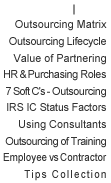HR and Purchasing Departments
In the extended enterprise – central role or administration function?
Internal departments such as HR and Purchasing risk being marginalized by focusing on traditional roles that service only the core organization, or by seeing themselves as gatekeepers, while the real focus is on enabling and building the extended enterprise.
Over the last decade, outsourcing has become one of the top areas of focus for many organizations. The leveraged business model has become a strategic tool for companies.
In part, outsourcing has been in response to "downsizing". Companies that are now smaller than before must look for ways of doing the same work, or more, with fewer employees. Further impetus has come from the burgeoning growth of companies in the high technology industry.
Outsourcing is also a result of a shift in mindset. The traditional notions of a corporation have changed. There is a new more dynamic business model where the permanent workforce makes up only the core or nucleus.
The concept of the virtual corporation has emerged to address the dynamic resource needs. Increasingly, external expertise is used in specialist areas, once the exclusive province of employee professionals.
Like many corporate functions today, Human Resources runs the risk of functional stereotyping along with a legacy mindset created by its earlier roles. HR is seen as focusing on the employee work-force while the external resourcing decisions are left up to the business units. Purchasing risks being relegated to Supplier-Buyer role, where Departments will bypass Purchasing processes and practices.
Outsourcing takes numerous forms. In each, there is a process to select the most suitable vendor. This may not always be the best vendor (i.e., the most highly qualified), so much as the best fit for the situation. And it may not be the vendor with the lowest bid.
Let’s look at the elements in selecting a vendor where that vendor (contractor, consultant, 3rd party) works directly with employees on:
- an internal project (e.g., product development, training design), or
- delivering a service to a customer (e.g., product training, systems development)
In these cases, selection goes beyond the technical, professional or industry expertise. The “personal style” or “cultural fit” of the vendor becomes one of the deciding factors. This type of selection falls more into the area of expertise of Human Resources, but it is typically Purchasing who gets involved.
Purchasing Role
Historically, vendor selection has been treated as a supply management issue because of the contractual considerations. Purchasing’s involvement was usually limited to providing managers with a list of preferred vendors and assisting in the execution of the contracts. In many companies, Purchasing acts as a gatekeeper, to contain the spread and proliferation of vendors.
Many vendors and departments who use vendors may view Purchasing as an obstacle to rapid engagement to meet the changing needs of a dynamic company. Payment to vendors may be delayed through overly complicated processes for approval of work and invoices.
As the emphasis on outsourcing grows, one way Purchasing can add value to the organization is to identify and select vendors that support the strategic and cost-effective objectives of the outsourced project.
To begin the partnering process, Purchasing needs to develop:
- a partnering relationship with the project or program manager, and
- a sound understanding of the vendor selection requirements against department goals.
Human Resources Role
Human Resource (HR) departments feel the ground shifting under their feet and are looking for new footholds. Pressure is building to redefine relevance. The profession that has been the champion of bringing in people and ensuring they stayed is now under the threat of being outsourced. Areas such as recruitment, benefits administration, and training are handled outside companies.
Nimble HR departments are redefining their own competencies to ensure relevance and influence in companies of the new millennium. Preparing organizations to effectively work with coalitions is key, and it is a major opportunity for the business-savvy HR professional to make a substantial impact.
HR departments and professionals can define their core competencies by recognizing, understanding and utilizing their unique strengths around people, performance, selection, culture, organizations and management.
Add to this an essential knowledge of the business, an effective network within the organization, and a reputation for results, and Human Resources stands to be in a prime position to deliver significant value to their company in the future.
At strategic levels, the HR professional can ensure the organization builds capabilities that the customer wants and values – and this is good for the business.
Summary
When outsourced work must be integrated with internal activities and the vendor deals with employees or customers as part of the project, good selection must take into account factors beyond simply best price and greatest expertise.
This is where Purchasing and Human Resources professionals can play a key role in selecting and integrating vendors to fit a situation, and become part of the extended enterprise.
© 2001 Endeavour Business Learning, 2006 Think180™
Note: To download a PDF copy of this article, go to the Think180 PDF Library page.
|


